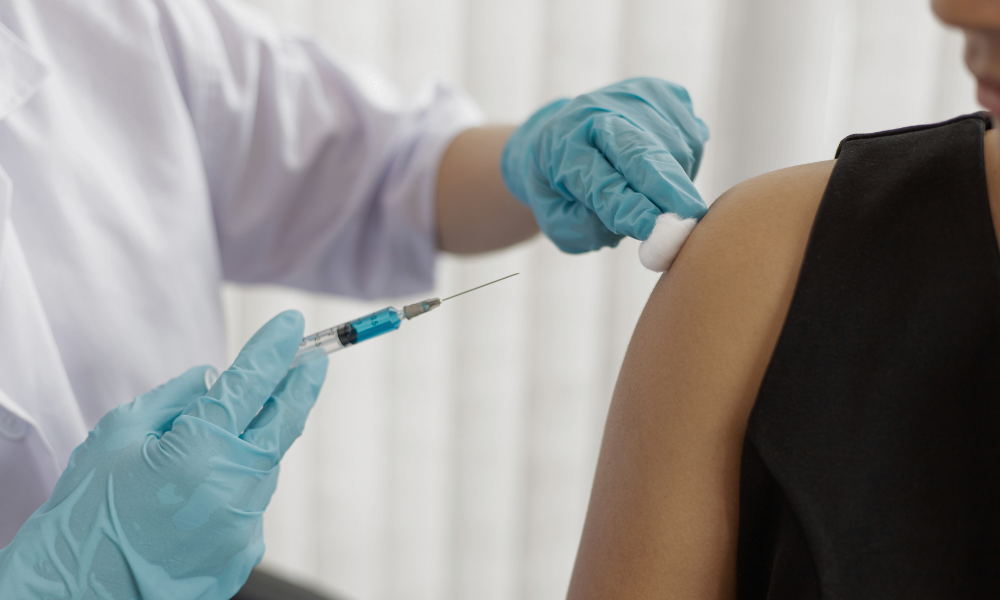The CDC issued an advisory statement this month to remind individuals and healthcare providers that the mpox (formerly called monkeypox) outbreak we saw in the United States last summer is not over. Though far from the August 2022 peak of 460 cases reported each day, the agency says it continues to get reports of new cases across the country, a sign that community transmission is still an issue. The CDC warns that spring and summer season could lead to “a resurgence of mpox as people gather for festivals and other events.”
What is mpox?
Mpox is a virus that causes flu-like symptoms and a rash/sores on the skin, the sores sometimes appear on the genitals and are mistaken for herpes or syphilis. Symptoms can last two to four weeks but most infections resolve without treatment or hospitalization. Mpox is transmitted through skin-to-skin contact or contact with an infected person’s clothing, towels, or bedding. While not technically an STI, mpox is passed through close physical contact and the majority of the cases in this current outbreak were the result of sexual behavior.
A global outbreak of mpox began in May 2022 and spread quickly throughout the world. Gay and bisexual men, other men who have sex with men, and transgender individuals were disproportionately affected by this outbreak.
The Mpox Vaccine
There is a vaccine called JYNNEOS that can protect against mpox and smallpox infections. The vaccine is given in two doses, four weeks apart. Unlike the Covid-19 vaccine and others, the CDC does not recommend widespread vaccination for mpox. It recommends JYNNEOS only for people who are likely to be exposed to mpox including gay, bisexual, and other men who have sex with men/transgender partners who have engaged in certain behaviors.
Specifically, the agency suggests the vaccine for members of this community who, in the last six months, have had more than one partner, been diagnosed with an STI, visited commercial sex venues (like sex clubs or parties), or had sex at a large public event (like a festival) in areas where mpox transmission is occurring. Partners of people who fit these criteria should also get vaccinated. The vaccine is also recommended for anyone who has HIV or other immune system issues.
Approximately 1.2 million doses of the JYNNEOS mpox vaccine have been administered in the United States since last summer, but the CDC estimates that only 23% of the population at risk for mpox has been fully vaccinated. While the vaccine remains the best prevention method, it is not yet clear how effective it is or how long immunity lasts. The CDC expects to see some cases in people who have been vaccinated.
A recent outbreak in Chicago confirms this as nine of the 13 people involved (12 confirmed cases and one suspected), had received both doses of the vaccine. Still, those who are vaccinated are likely to experience less severe symptoms if they do become infected.
A Focus on Prevention
Changes in sexual behavior can also help stop the spread of monkeypox. In fact, widespread changes in the behaviors of gay, bisexual, and other men who have sex with men were credited with slowing the outbreak last summer. The CDC suggests that people in these communities take a temporary break from activities that increase exposure to mpox (like sex parties or bath houses) until at least two weeks after their second vaccine. Other safer sex suggestions include avoiding the exchange of saliva; using condoms and other latex barriers; changing positions to avoid prolonged face-to-face contact; and remembering to wash hands, fetish gear, sex toys, and any fabrics (bedding, towels, clothes) after having sex.
The CDC asks individuals to monitor their own symptoms and seek medical attention if they have any unexplained rashes. The alert also suggests that clinicians refamiliarize themselves with mpox symptoms, testing, and treatment options, and urges them to be on the lookout for new cases. It adds that clinicians should test anyone they suspect of having mpox even if that person had the virus already and/or has been vaccinated.
ASHA’s president, Lynn Barclay, noted that we learned a lot from last summer’s outbreak and we are better prepared for rises in mpox cases, “The mpox outbreak took us by surprise but we’re ready for it now. We know how important vaccination is to prevent the spread and lessen the severity of symptoms in those who do get infected. We also know that changes in behavior work to prevent community transmission. I’m confident that with the knowledge and tools we have now, we can keep mpox in check this summer.”






